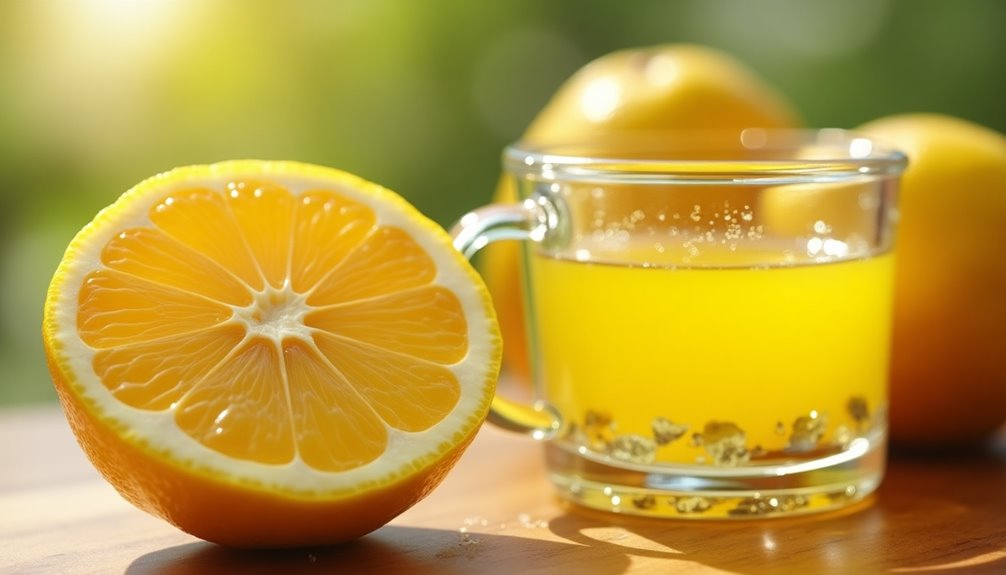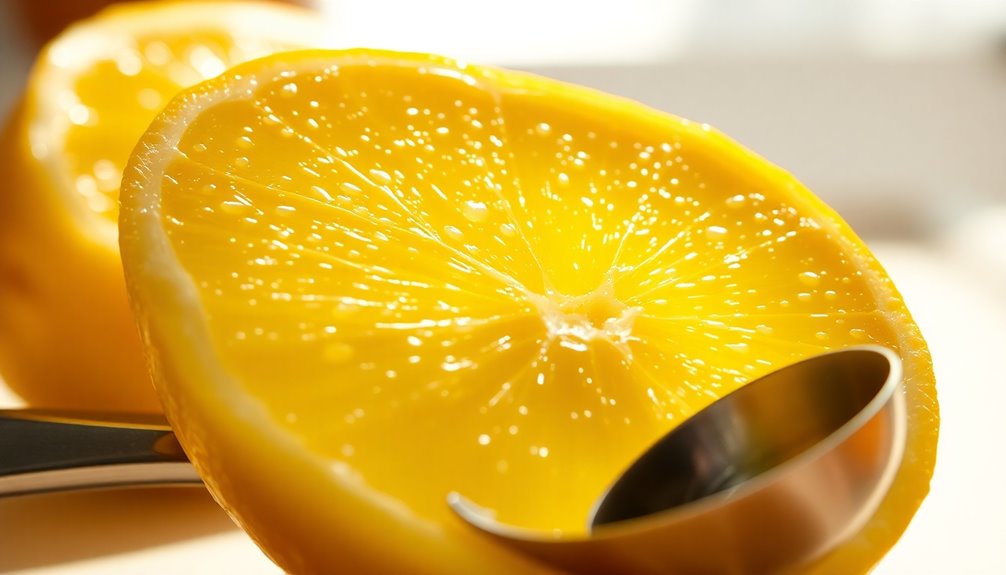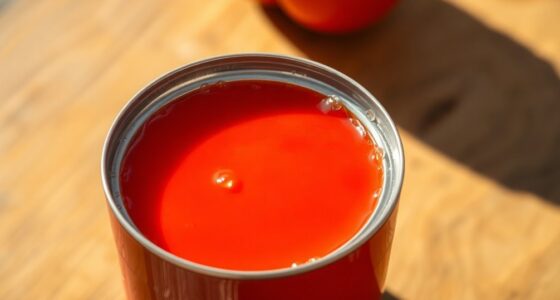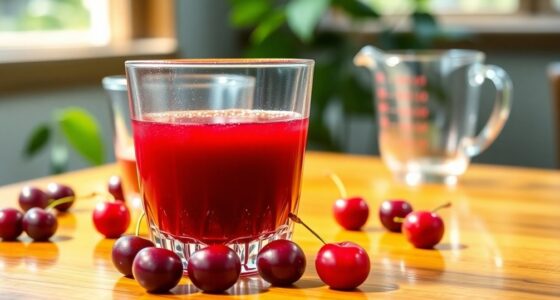Half of a medium lemon typically yields about 1½ tablespoons of juice. If you're using larger lemons, you might get even more, up to 2 tablespoons or so. It's also important to note that the ripeness of the lemon can affect the yield—riper lemons produce more juice. So, if you're planning a recipe, it's a good idea to have a few extra lemons just in case. There's more to learn about maximizing your lemon juice yield!
Key Takeaways
- Half of a medium lemon typically yields about 1½ tablespoons of juice.
- The juice yield can vary based on the lemon's size and ripeness.
- Ripe lemons generally produce more juice compared to older or overripe ones.
- Using a citrus juicer can help maximize the juice extracted from the lemon.
- Rolling the lemon before cutting can also increase the juice yield.

Ever wondered just how much juice you can squeeze from a lemon? You're not alone in your curiosity, especially if you enjoy cooking or baking. Knowing the amount of juice a lemon yields can really help you nail those recipes that call for fresh lemon juice. So, let's break it down.
A whole medium lemon typically produces around 3 tablespoons of juice. That's a good amount for many recipes, but it's important to consider the size of the lemon you're working with. If you've got a medium lemon, you can expect to get about 1½ tablespoons of juice from half of it. This means if a recipe calls for two tablespoons, you'll need to squeeze a bit more than half a medium lemon.
Now, if you're dealing with larger lemons, the juice yield can be even more generous. A large lemon can provide you with up to 4 tablespoons of juice, which is approximately ¼ cup. So, if you're wondering how much juice you can get from a large lemon, you might be pleasantly surprised by the amount of juice it yields. This can come in handy for recipes that require a larger quantity of lemon juice.
When you’re planning to make a dish that demands more lemon juice, like a salad dressing or a dessert, it’s good to know how many lemons you might need. For instance, if a recipe calls for ½ cup of lemon juice, you’ll need about 3 medium lemons or just 2 large lemons. That’s quite a bit of juice, but having that extra lemon or two on hand can save you from a last-minute grocery run. It’s also helpful to remember that the amount of juice you can extract from a lemon can vary depending on its size and freshness. On average, you can expect to get about 2 to 3 tablespoons of juice from a medium lemon, which is why it’s important to know how much juice in one lemon you can typically expect. If you find yourself short on juice, consider using a citrus juicer or rolling the lemon on the counter before cutting it, as this can help maximize the yield.
You might find that depending on the ripeness of the lemon, the juice yield can vary. A perfectly ripe lemon will usually yield more juice than one that's a bit older or overripe. This variability is something to keep in mind when you're cooking.
If you're preparing a dish that relies heavily on lemon juice, having extra lemons is always a smart move. You wouldn't want to come up short when you're in the middle of mixing up a recipe!
Frequently Asked Questions
How Much Juice Is in Half a Lemon?
When you're squeezing half a lemon, you can expect to get about 1 to 1.5 tablespoons of juice.
If you happen to have a larger lemon, you might squeeze out around 2 tablespoons.
The actual amount can vary based on the lemon's size and ripeness, so it's always a good idea to taste as you go.
Adjust your measurements to suit your recipe or personal preference for the best flavor!
How Much Bottled Lemon Juice Equals Half a Lemon?
If you're looking to substitute bottled lemon juice for half a lemon, you'll typically need about 1.5 tablespoons.
This amount should give you a similar flavor, but keep in mind that bottled juice can taste different from fresh.
Always taste your dish and adjust the quantity if necessary to achieve the flavor you want.
It's a simple way to keep your recipes zesty without the hassle of squeezing fresh lemons!
Can I Use Bottled Lemon Juice Instead of Fresh Lemon?
You can use bottled lemon juice instead of fresh lemon, but it's not always the best choice.
Fresh lemon juice provides a bright, vibrant flavor that bottled juice often lacks due to preservatives. If you're making recipes where lemon flavor is key, like dressings or marinades, you'll get better results with fresh juice.
If you do substitute, remember to adjust the amount, as bottled juice can be more acidic.
How Many Drops of Lemon Juice Do You Get From Half a Lemon?
When you squeeze half a lemon, you can expect to get around 30 to 40 drops of juice.
The exact amount may vary depending on the lemon's juiciness and how you squeeze it.
If you're aiming for a specific flavor in a recipe, it's a good idea to taste as you go.
Adjusting the juice based on your preference can enhance your dish, so keep that in mind while cooking!
Conclusion
In the garden of flavors, a lemon's essence dances in every drop. When you squeeze half of its sun-kissed skin, you uncover a treasure of about one to one and a half tablespoons of juice. Just like a gentle breeze carries the scent of blossoms, this liquid gold brings brightness to your dishes. Embrace the zest of life, and remember, whether it's half a lemon or a whole, each drop is a burst of sunshine waiting to enhance your culinary journey.
Cindy thoroughly researches juicing trends, techniques, and recipes to provide readers with practical advice and inspiration. Her writing style is accessible, engaging, and designed to make complex concepts easy to understand. Cindy’s dedication to promoting the advantages of juicing shines through her work, empowering readers to make positive changes in their lives through the simple act of juicing.

















